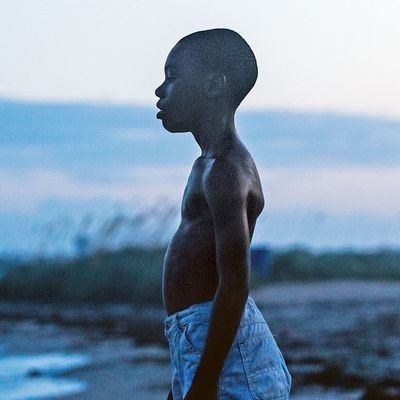
Hype would bruise Barry Jenkins’s Moonlight, which is so delicate in its touch that the usual superlatives sound unusually shrill. It’s the gentlest, most suggestive of great films. In three distinct chapters featuring three different actors, Jenkins puts you inside the head of a closemouthed, fatherless African-American protagonist, Chiron (pronounced Chy-rone), as he grows from a lonely boy to a lonely adult, with a single moment of connection in the middle of the middle section: a brief sexual encounter with a teenager named Kevin on a Florida beach. The movie’s first half builds to that moment, the last half falls away from it. But you can’t pin Moonlight down as a gay-awakening film — or a fear-of-coming-out film or anything centering on sex or love. It’s deeper than that. The title alludes to an idea about the moon: that in its light you realize that only you (not the gods, not other people) can decide who you want to be.
Chiron’s identity is largely controlled by others. In the first section, a child (Alex Hibbert) is saddled with the nickname “Little,” as well as “faggot.” When the bullies chase him, he doesn’t make a beeline for his mom, Paula (Naomie Harris), a bedraggled addict who loves but can’t protect him. He squeezes into an abandoned building, where he’s found by a drug dealer named Juan (Mahershala Ali), who takes him out for dinner and home to his kind, outspoken girlfriend, Teresa (the singer Janelle Monáe). The magnetic Ali plays Juan as a man whose job has made him hard but who’s still capable of empathy. He tries to make the boy believe in himself. He radiates decency. He’s everything you could want in a surrogate father — until Chiron’s mom drives up with her sleazy boyfriend and begs for drugs and Juan takes her cash, even if he knows what that will mean for Chiron. It’s just what he does.
But it’s Chiron’s interaction with a boy his own age that shapes his life. In the first part, the tight, wary youngster is goaded by Kevin (Jaden Piner) into fighting back against bullies. As teenagers (Ashton Sanders and Jharrel Jerome), they have that tender, carnal communion on a beach — with a devastating aftermath. Finally, they meet as adults. Chiron (Trevante Rhodes) is a muscled-up drug dealer going by the name “Black,” Kevin (André Holland) a fry cook and new father who might or might not understand the full impact on Chiron of their teenage intimacy. He understands something, though. That’s why he phoned Chiron after all these years.
The rhythms of Moonlight are moody, mercurial. In some scenes, time stretches out, as if Jenkins were waiting for the characters to find their own words — which don’t always come. In other scenes, the pitch is madly heightened. We hurtle through the school with Chiron as he seeks to avenge a humiliation — probably the first decisive action of his life and the one with the most dismal consequences. The music says what Chiron and Kevin can’t. In a Miami diner, the jukebox plays Barbara Lewis’s melancholy but inviting “Hello Stranger,” with its immortal refrain “It seems like a mighty long time.” I don’t know how to do justice to the actors in this scene — the song infuses their performances. Holland’s Kevin is warm and gregarious, but with a hint of fear — he knows he can’t fill all Chiron’s silences, and there’s one memory that he dreads dredging up. Rhodes’s Chiron, meanwhile, has pumped himself up and stuck metal grills in his mouth and chains around his neck. But he somehow looks more naked and vulnerable than ever. He has the same frightened eyes as the boy they called Little. The evolution of Chiron is so fluid that this could be one actor shot over a decade, as in Boyhood.
Moonlight isn’t weighed down by psychologizing, but you can infer all sorts of things about the effect of an absent father on Chiron’s sense of self (the name evokes the centaur — half-man, half-horse) and the power of a culture given to crushing all manifestations of male sensitivity (let alone gayness). You can infer the dire impact on Chiron of a crack-addict mother — she does, tearfully, in later scenes, when the damage is done and his character formed. But it might be better just to think about the moon — and how all our choices of who to be might look in its pitiless light.
*This article appears in the October 17, 2016, issue of New York Magazine.


